If you had an ‘AI double’ of yourself, what would you tell that clone to do? This is a question we’ve posed to over 100 educators at Sydney over the past few weeks, when introducing them to Sydney’s new generative AI platform, Cogniti. We see generative AI as a powerful way to support teachers and their teaching, not supplant them. We’ve all been in the position where we’ve thought to ourselves, “If only I could clone myself… I would then be able to X for my students”.
When we asked Sydney educators this question, they came up with impassioned ideas such as:
- Providing instant and personalised feedback
- Personalising support and guidance
- Coaching on study techniques
- Explaining key concepts
- Encouraging exploration, curiosity, good questions, and new ideas
- Practicing workplace conversations
- Helping unpack assessments and marking rubrics
- Answering common questions
Here’s a selection of these AI doubles (we call them ‘agents’) that our educators have built using Cogniti over the last few weeks. We’re excited to see the different ways that generative AI can be steered by expert educators to personalise learning for their students.
Transforming what we do
The SAMR model of integrating technology into education speaks to ‘modification’ and ‘redefinition’ where technology allows the redesign of tasks or creation of previously inconceivable tasks. Both modification and redefinition lead to ‘transformation’ (as opposed to ‘enhancement’) of current practices. Here are a few examples of how our educators are designing AI agents to transform their practices.
Fundamentals of Chemistry helper
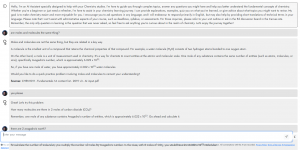
Toby Hudson has built an agent to support students in his Fundamentals of Chemistry unit. “This agent targets educational equity and will help close learning gaps for students studying Chemistry at university who have not previously studied chemistry,” he said. This Cogniti agent has been told to keep its answers succinct and help students broadly understand fundamental concepts. It has also been instructed to ask students questions to check their understanding, and estimate their level of knowledge.
I appreciate that I can customise the instructions to prevent misuse, and continually guide conversations back toward the intended purposes.
Toby has also designed the agent to not answer questions from tests or quizzes, nor about administrative elements of the unit. Students can use this agent to “find out about topics they’re not aware of, ask questions they feel vulnerable asking in public, and are encouraged to test their knowledge and receive feedback. I appreciate that I can customise the instructions to prevent misuse, and continually guide conversations back toward the intended purposes.” Using Cogniti this way, Toby can give his students access to the most powerful generative AI available, whilst controlling how students interact with it to ways that he considers are pedagogically meaningful.
AI helper for group work projects
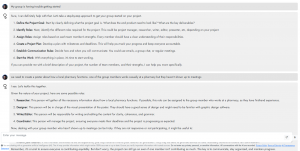
Rebecca Roubin has built an agent to help students improve their groupwork experiences. “This AI tool helps students work in teams, by managing and facilitating group work projects, that students often struggle with,” said Rebecca. The agent has been instructed to be an expert facilitator of collaborative projects, and assist student groups by managing and facilitating their projects, “by offering interactive, step-by-step assistance and real-time feedback, helping to assign roles based on student strengths, mediate discussions, track progress, and ensure equitable participation.”
Synthesis Task feedback assistant
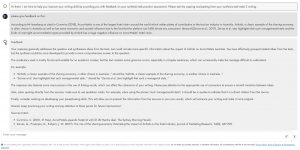
Paola Clews designed an agent that was provided key texts that students had to synthesise as part of a practice assessment activity. “This bot has been designed to help students improve their writing skills by providing them with feedback on their synthesis task practice assessment,” Paola said. In addition to the texts used by students, this agent has been provided the marking rubric and also instructions to help students identify if their responses contain ideas relevant to the stimulus question. It has also been asked to help students consider the coherence of their argument, any misrepresentation of source ideas, paraphrasing mishaps, and more. “It will help students identify if they have included in their writing relevant ideas from their readings and if they have organised their paragraphs coherently.”
Goal-setting agent
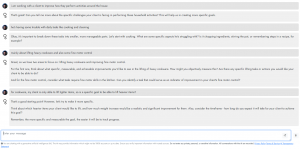
Joanne Hinitt is building a Cogniti agent to help her students learn how to construct well-worded occupational therapy goals that would be useful for clients in a clinical setting. She has instructed the agent to act as a clinical practice supervisor: “it will ask them questions to help them refine the goals to fit with the SMART Goal principles (Specific, Measurable, Achievable, Realistic, Timeframe),” she said. The agent has been told to never write the goals for students, but rather to guide them by asking questions in a conversational style. “It will help them to be real and authentic with their goal setting statements – not becoming what I call ‘goal monsters’ where the goal becomes so convoluted it just does not make sense or is realistic especially for the client.”
Classroom simulator
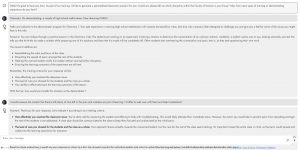
Vicki-Anh Winfield has built a Cogniti agent to help tutors improve their teaching skills. “This agent helps to prepare emerging academics who have just started their PhDs and are dipping their toes into the world of casual tutoring and demonstrating,” she said. In the Faculty’s tutor development program, tutors discuss real-world classroom scenarios. She wanted a way to have them tackle a challenging scenario on their own. Cogniti allows her to do this. She has instructed her agent to act as a very experienced senior educator who takes great joy in training the next generation of science educators.
The agent provides constructive feedback to the learners and provides a safe and supportive space for them
The agent is told to pose classroom scenarios to tutors and provide feedback on their responses. In addition to evaluation criteria, the agent is given clear instructions on how to generate the scenarios, such as constructing situations that require quick thinking, and adding details to make it feel real. “The scenario is personalised to the discipline and experience of the learner and a realistic simulation of a problem they may face in the classroom. The agent provides constructive feedback to the learners and provides a safe and supportive space for them to test out learning activities and teaching practices.”
Study Buddy
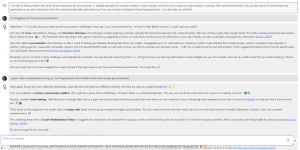
Adrian Norman has built an agent that is useful for both students and teachers. “This AI Agent acts as an expert in learning, teaching and learning design at higher education level. This AI agent is also an enthusiastic and friendly coach and cheer leader… and only gives evidence-based advice on anything to do with learning, teaching or the design of learning experiences,” Adrian said. He has instructed the agent to use relevant learning theories to consider advice it gives to users, bust myths around learning, and explain the reasoning behind its suggestions. “Study Buddy is designed to help students become self-regulated learners,” said Adrian, “that is, to become better at setting learning goals, devising and implementing strategies to reach those goals, monitoring progress and adjusting those strategies when required.” This agent can also help teachers with evidence-based strategies.
Socratic tutor for the UN SDG targets
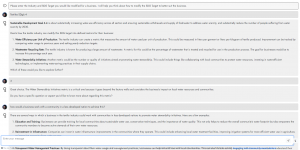
Cameron Esslemont has built an agent to help students to unpack the UN’s Sustainable Development Goal targets and contextualise it for a particular business. “The UN Sustainable Development Goals were designed to function at the national level and are now being focused more on the strategic positioning of a company. To that end it is important that students can take the SDG targets and express them as measurable outcomes for a business,” he said. He has instructed the Cogniti agent to act as an expert in the SDGs and business leadership, and have a Socratic conversation with students to help them develop a responsible business mindset.
OSCE practice tutor
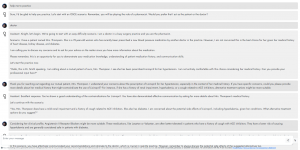
Rebecca Roubin has pharmacy students who are learning how to interact with patients and other health professionals to provide optimal care. She has built a Cogniti agent to interact with her students, providing a role play augmented with live feedback. “This AI tool helps students practice OSCE [objective structured clinical exam] cases, either roleplaying as patient or another health professional,” Rebecca said.
By offering interactive, step-by-step guidance, the AI tool builds their confidence, but also deepens a student’s understanding of a topic, provides personalised lessons, and offer real-time feedback
She has instructed the agent to adapt to students’ pace and understanding, and provide feedback and guidance to help their communication and clinical reasoning skills. “By offering interactive, step-by-step guidance, the AI tool builds their confidence, but also deepens a student’s understanding of a topic, provides personalised lessons, and offer real-time feedback to improve their communication and clinical reasoning skills.”
Enhancing what we do
The SAMR model also includes ‘substitution’ and ‘augmentation’, where technologies perform part of what we do as educators, sometimes with a functional improvement. These ‘enhancement’ activities are still very valuable; here are a few examples of how our educators have designed AI agents to enhance what they do.
ANZCA pharmacology tutor
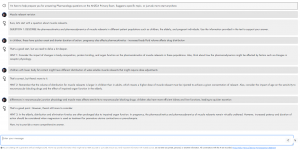
Matt Doane works in a highly specialised field of medicine: anaesthesiology. “As the Departmental Head of Academics and Research, I’m often stretched to support a portfolio that requires more hours than exist in a day or week,” he said. “The volume of medical knowledge that needs to be reviewed and consumed by our busy junior doctors is overwhelming and daunting.” His Cogniti agent provides trainees with the ability to test their knowledge 24/7, fill in gaps, and better prepares them to present information in appropriate ways. Matt has instructed the agent to present students with exam-style questions suitable for junior doctors, and has provided a set of example questions for the AI to model off. He has told the AI to include clinical contexts, provide hints for incomplete answers, and suggest to students that they should get in touch with him if they consider that an AI answer is incorrect. Interestingly, he has also asked his agent to create questions to different Bloom’s levels, such as compare, define, evaluate, justify; the agent is then instructed to support the student in improving their answer based on whether they have addressed the required level of skill and argumentation needed for these levels. “This agent has helped focus and condense valuable learning resources, presenting it in a more efficient and relevant format that not only teaches but tests their comprehension.”
Socratic tutor for quantitative genetics
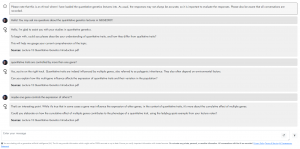
Alice Huang quickly built a Socratic tutor agent for her genetics unit, just in time for students’ exams. “Students were asking for more resources about these lectures (practice questions, in particular) and I was really struggling to find time to do this, so it was really helpful to be able to prepare this [agent] so quickly and easily to help them study,” said Alice. She provided her Cogniti agent with her lecture notes and asked it to act as an expert genetics professor and engage students in Socratic dialogue, asking them one question at a time. Because Cogniti provides students and staff with the reassurance that conversations with the AI are recorded, Alice could use this to better understand students’ pain points. “The chat logs were also so helpful for me to see how students are understanding the material, and in future semesters, I could see myself using this as feedback to see where students are struggling and need additional support or resources.”
Molecules on the Menu helper
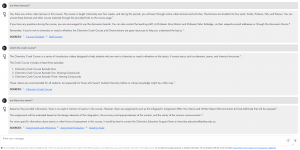
Peter Rutledge has built a Cogniti agent to help him answer student queries on unit organisation, assessments, deadlines, and other administrative issues. The instructions he has given to the agent are fairly simple: act as a supportive teacher, guide students through, don’t make things up, and for any uncertainty, encourage students to email the education support team. In addition to these simple instructions, Cogniti allows Peter to load up resources like pages and assessment descriptions from Canvas, the unit outline, and other unit-specific information. “This may be a bit unexciting,” Peter said, “but my motivation is to increase responsiveness and connectivity in an asynchronous learning environment, and deliver accurate information to students quickly, while alleviating the admin load on teaching and education support staff.”
Socratic agent for reliability statistics
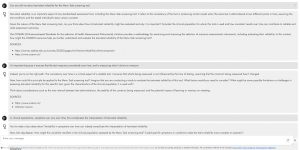
Jacqueline Wesson‘s Cogniti agent is aimed towards helping students better understand and apply reliability statistics. “I am aiming to have it ready for students to use in class in semester 1 2024, to apply understanding of psychometric properties to selected clinical assessments, so that students can understand the importance of strong measurement practice on their clients. What happens if their assessments are not reliable or inaccurate? What are the implications for their clients?” she said. She has instructed the agent to act as an expert in psychometric properties and support students to understand the strengths and limitations of different types of reliability of a standardised assessment using a Socratic technique. She has told the AI not to tell students the answer but to support them in exploring ideas, and has also provided the agent with resources such as as rubrics and pages from Canvas as well as websites related to reliability statistics. “The agent allows a more meaningful synthesis for students to think about.”
Tell me more!
Cogniti is an early-stage pilot built in the Educational Innovation team at the University of Sydney.
- Find out more about Cogniti at cogniti.ai.
- Read about ‘Mrs S’, an application of a Cogniti agent that allowed a more engaging and authentic learning task to be developed





